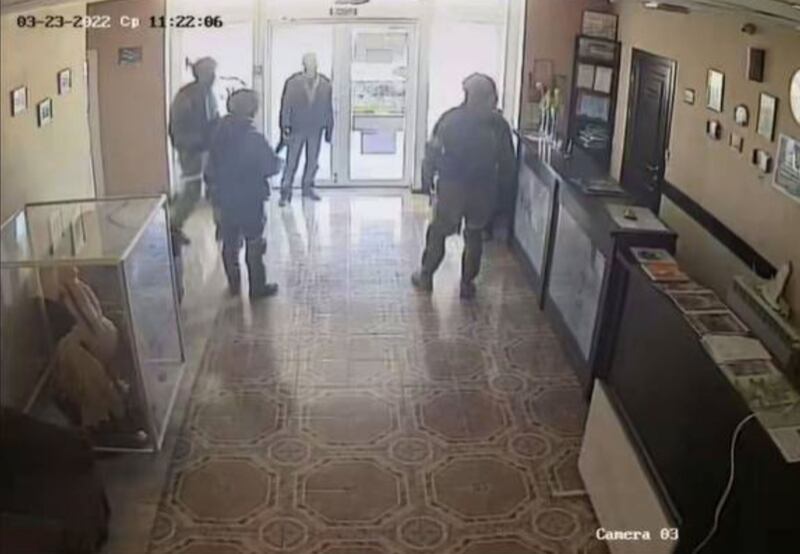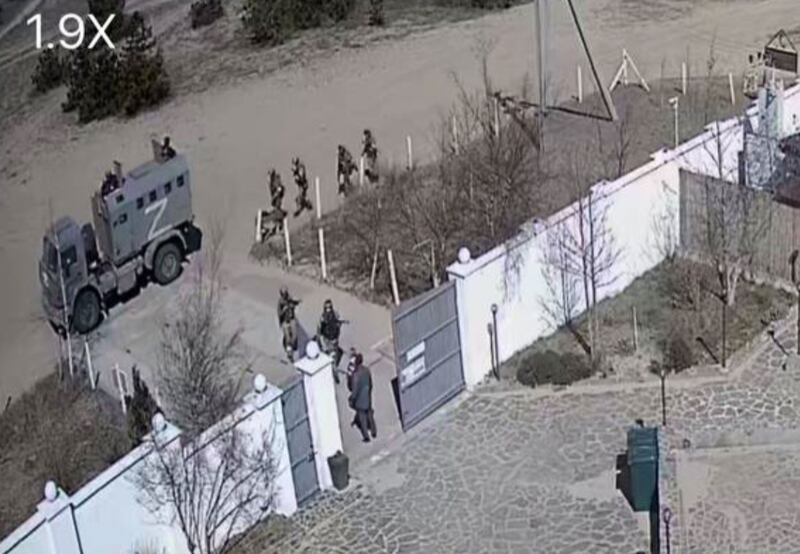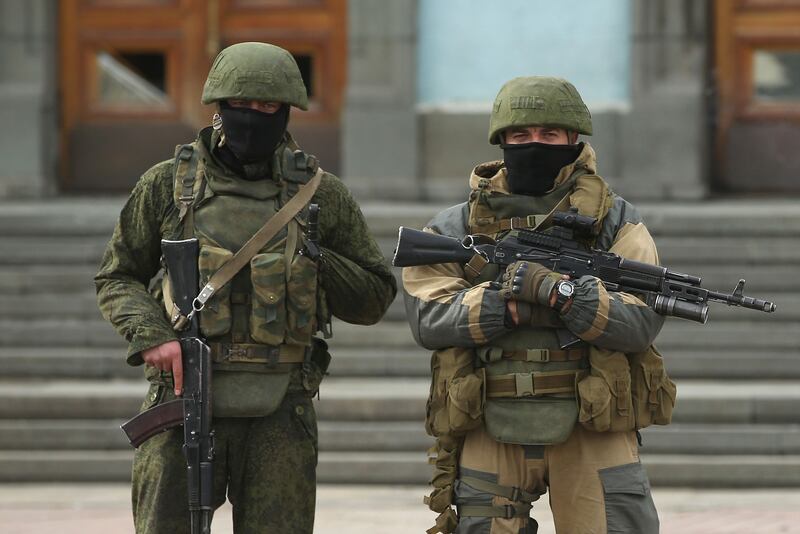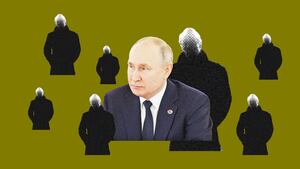Residents of occupied regions of Ukraine expected the worst when Russian soldiers seized control of their towns. While those who could flee left in the early days of the war, many homes and properties sat empty, waiting for the day that the owners could return to the lives they had left.
But they had not planned for Russian soldiers to use their homes as military bases—or auction off their land to the highest bidder in Vladimir Putin’s home country.
While Ukraine’s fight to reclaim territory rages on during the grueling counteroffensive, some Ukrainians who managed to avoid life under occupation have already received the devastating news that Russian soldiers and civilians have moved into their homes.
That includes Inna, a 60-year-old woman from Kyiv who owns a second home and two businesses on the Kinburn Peninsula. She requested her last name be withheld for the protection of loved ones living in occupied areas.
Long before Russian soldiers seized her property, Inna and her husband had been longing for a getaway—somewhere they could go to escape the chaos of Kyiv and relish the calm of nature. In 1991, they took the plunge, and decided to build a second home in the rural region of the Kinburn Peninsula.
“It’s a recreational area, very healthy climate for my child, also for recovery. And they lived there for half a year,” Inna told The Daily Beast, adding that she and her family frequently visited the home when her child was growing up.
In fact, the family loved the new area so much that in 2014, despite the economic turmoil Ukraine was experiencing due to Russia’s invasion of the eastern Donbas region, they decided to open the Pelican Hotel, an environmentally friendly establishment on the Kinburn Peninsula.
“Everyone believed that we can make it work,” Inna said. “It’s difficult in Ukraine to do business. It’s complex, but if not us, who? We need to do business to grow, to develop, to pay taxes.”
Over the years, Inna developed deep ties with her second home on the Kinburn Peninsula—evening purchasing a farm, her third property in the region. The rural community of the region was meant to be a place of solitude, but when the full-scale invasion began in February of last year, life on the Kinburn Peninsula came to an immediate halt.
Friends who remained in the community told Inna, who was in the capital at the time, that Russian soldiers arrived in the region within hours of the war. With no safe way to get to any of the properties she owned in southern Ukraine, Inna often relied on friends who were unable to escape from the region before it was occupied as trusted sources for updates on what was happening on the ground.

A screenshot of video camera footage showing Russian soldiers inside Inna’s home.
HandoutBut on March 23, 2022, she was able to watch the chaos unfold herself. That night, surveillance footage from security cameras captured the moment Russians raided her hotel. Inna had remote access to the footage, and could do nothing but watch helplessly.
Screenshots of the incident sent to The Daily Beast show eight soldiers and a gray van with the letter “Z,” a symbol used by Russia throughout the war, painted in white on its side, parked in front of the Pelican Hotel. Reviewing the footage, Inna was able to identify two of her employees speaking with Russian soldiers near the gate of the hotel. Later, three people who remained in the area during the occupation told her that the workers were arrested by Russian soldiers that night.
“They [Russians] tried to contact me, probably to ask for ransom, but I decided I would not deal with them,” said Inna, adding that the workers were allegedly released nine days after their arrest.
On June 23, 2022, Inna said that she stopped being able to access surveillance footage of her hotel. She was told by her informants in the region that “[Russian soldiers] shot the cameras… So it was not possible to see anymore what was going on,” as they proceeded to loot the hotel. “So they were coming with trucks and taking stuff,” said Inna.
At the same time, 62 miles away from the peninsula in Hola Prystan, a village in the Kherson region, Inna was told by the administrator of a farm she owned that Russian soldiers had taken control of the property.
The farm was a labor of love for Inna, who has spent her life working to improve animal welfare in Ukraine. She grew fresh produce and bred livestock, including 12 cows, 15 calves, and 150 chickens, to feed patrons of her hotel without buying from Ukrainian meat factories.
But when Russian soldiers occupied the farm, Inna’s administrator told her they “Looted everything.” She added that the hardest part was they “killed all my animals. They killed my two dogs.”
Conditions in the occupied communities took a turn for the worse after Russian President Putin announced a series of referendums leading to the illegal annexation of four territories—Donetsk, Luhansk, Zaporizhzhia, and Kherson. Inna said that around that time, she heard from friends on the peninsula that Russians were planning to auction off her three properties to the highest bidders from their country.
Not Alone
Inna is not alone in having her properties taken over by Russian soldiers and residents. Citizens throughout Ukraine’s occupied regions are grappling with Russians occupying their homes, claiming their lives and belongings as their own.
In Severodonetsk, a city in the eastern Luhansk oblast, a woman in her thirties who asked to be referred to as “Victoria” was told by family members that a Russian worker had moved into her childhood apartment sometime during the fall of 2022.

A screenshot of security footage shows Russian soldiers outside the gate at Inna’s home in Ukraine.
HandoutThe apartment had belonged to Victoria’s grandmother during the Soviet Union. The home is small, with just two rooms, a type of low-cost apartment called “Khrushchevka”—named after Nikita Khrushchev, the former Soviet premier. Although it is old, with few modern renovations, Victoria cherished the space: “All my background is there—school albums, all family photos, my late grandmother’s things, childhood memories,” she told The Daily Beast.
When the war began, Victoria’s mother spent two weeks living in the basement outside of the apartment with more than a dozen people, leaving only once a day to feed her cat and call her daughter. “Then a shell hit the basement they were hiding in. My mom said it was very scary. The metal door of the basement was crushed, everything was shaking, but they survived and had to look for another shelter,” Victoria said.
Eventually, Victoria’s mother and another family member were able to leave Severodonetsk, fleeing to nearby Kramatorsk before leaving for Kyiv. But Victoria said her mother’s mental health has deteriorated over time, experiencing panic attacks with every air raid—a symptom of the post-traumatic stress disorder she developed during her time in Severodonetsk, she explained.
Since her mother escaped, Victoria has tried to remain in contact with family members who stayed in Severodonetsk, which remains occupied today.
“We can’t communicate very well with the [relatives], but from the very beginning of occupation, they kept writing to us to come back home,” said Victoria. That fall, Victoria said her relatives, “Told us that the occupation authorities had inspected all the houses and selected those that were habitable, and if we did not return by a certain date with the documents proving our ownership of the apartment, Russians would be moved in,” she added.
Victoria and her mother told their relatives that they would not risk returning to their occupied town, adding: “We have all the documents. How can someone just take something away from us?”
Soon afterward, she said that a relative went to retrieve some photo albums from the apartment, memories of the life the family had left behind, only to find that the door locks had been changed.

Heavily armed troops stand guard outside a local government building in Simferopol, Ukraine.
Sean Gallup/Getty“He [relative] rang the doorbell, and a strange man, a Russian, opened the door. He was some kind of worker who was brought from Russia to work in the city,” said Victoria.
While Victoria was told the relative fought back, demanding that the Russian man leave his family member’s home, the intruder allegedly argued that he had moved in “By law. And if you don’t like something, go to the authorities and sort it out.”
Victoria said that once her mother heard about the fate of her childhood home, she began to cry, repeating over and over again, “It is everything that's left from my mother. What have they done?”
Eventually, Victoria’s relatives gathered the correct documents to prove ownership of the apartment and in March 2023, the Russian worker was forced to leave the home.
On that day, Victoria’s mother received a text message, which has been shared with The Daily Beast. It read: “Aunty, Hi. We have taken the keys away, the apartment was removed from the settlement,” regarding a list of homes where Russians could stay in the village that Victoria sent to The Daily Beast. The text continued “Wow, we did it!”
Victoria acknowledged that the apartment is just “walls,” but she said it is more than that to her and her family. The apartment is “filled with memories. It’s our history, my family’s life.” Victoria noted that since 2014, she has been forced out of her home by Russians twice.
Like Victoria, a woman named Iryna from Maksyma Horkoho, in the Zaporizhzhya region, had built a lifetime of memories in the home she shared with her husband for 30 years. But the shelling, constant power outages, and food shortages brought on by the war was making life in the village unbearable.
“We cared about our house, did renovation, had new, nice furniture,” she told The Daily Beast, adding that “had a small garden near our house.”
Iryna said that eventually, her daughter—who lived in Western Ukraine—called them “crying, begging ‘father, mother, get out of there!” Iryna’s husband, however, resisted “for a long time.” “Where do you want us to go?” Iryna recalled him asking. “There is shelling, shooting, bombing.”
Eventually, he was persuaded, and the couple attempted to evacuate to Poland on April 14, 2022. At the time, there were already Russian checkpoints that the couple had to pass through to escape their village. According to Iryna, the soldiers who stopped her car were from the Donetsk People’s Republic, an internally unrecognized republic of Russia that was annexed from Ukraine during the 2014 invasion.
“We passed at least 40 checkpoints in every village. What helped us? That we were going with our dog, [a] husky, and when Russians saw the dog, they didn’t check us for long. And my husband is of pension age, so [they] didn’t undress him,” like they did with younger men, Iryna said. Russian soldiers have been known to check Ukrainian men’s tattoos, cars, and phones for any sign of collaboration with the country’s military.
When the couple got to Krakow, Poland, they had a hard time getting any information about the state of their village, which had been fully occupied that summer.
But in November 2022, Iryna received a text message from a former classmate of her daughter, which was seen by The Daily Beast. “Bad news,” the classmate said, before explaining that a Russian collaborator in the village had allegedly given soldiers a document which claimed that Iryna had given permission for enemy soldiers to live in her home, with a forged signature.
“I didn’t allow anything,” Iryna replied, to which the woman texted: “You know who wrote it and that it is a fake.”
After that, Iryna said the woman told her “Russians have [begun to] settle in your house.’ I asked whether they broke the door. She said they’re trying to get in. I told them not to break it. I will tell them where the keys are. It was at another village resident’s [house].”
Iryna’s home is located in the center of the village, and before Russian soldiers had allegedly taken it up as a residence, the classmate who remained in Maksyma Horkoho had gone to the home to retrieve some of the more valuable things that she left behind, like family heirlooms. She has little information about the soldiers who moved in except for the bits of news her daughter’s former classmate has shared: at first, it was two older men who moved in, then gradually more and more settled in. Iryna is unsure exactly how many are residing there.
“I knew that it will happen, that someday they will come there and settle there. I didn’t have hysteria. I accepted this. Let it be as it will be. I will never return to that house. I knew that I would never return. My house was robbed,” said Iryna, adding that the woman had told her that soldiers had “looted the house, took the fridge, all my new furniture, mattress.”
“I don’t even try to get information. Only sometimes I ask [a] girl who helped me to take my things. I ask her if they are still living there. She said yes,” she added.
Iryna does know that in her once peaceful village, a wave of silence has washed over its people. Those who remained try to stay home, only leaving to go to the store and run other essential errands. Children no longer run around the village or ride bicycles on its streets.
“Russian soldiers are not only in my house, but also in the houses of other people who left for Ukrainian-controlled territories. I try to think about as little as I can. I don’t want to repeat it again. I don’t plan to return there,” she added.
‘Part of Me Is Buried’
Back in Kyiv, Inna said she knows very little about the claims that Russians are planning to auction off her land. Websites like Avito, similar to eBay, list properties in occupied areas of Ukraine for Russians to buy, but locating specific land can take days, and require a virtual private network (VPN) set to Russia.
Inna was told by her friend on the peninsula that Russian workers had come to her hotel to assess it and report back to their bosses back in Moscow, but that it had yet to be sold.
But losing her home and hotel to Russians is not her biggest concern. What worries her the most, she said, is the future of the two animals that managed to survive the Russian aggression on her farm: two horses that she has hired a local resident to care for.
“There was a lot of talk about the worst [case scenario], and no one believed that this would happen, that this would be possible… that in the 21st century, it’s possible for Russians to take over my house, to take over my business, to [take her employees] into captivity,” Inna said.
“People say that time is healing, but it’s not true. There is a feeling still of the pain of chronic disease, and part of me is buried there with my animals. And I understand that my life won’t be cheerful anymore after all of this. And my life won’t be so happy.”






